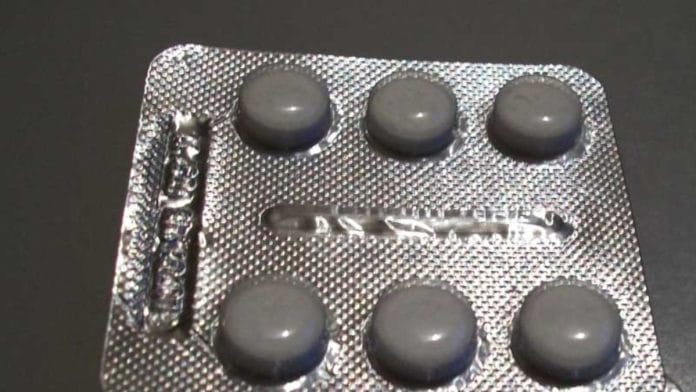New Delhi: An Indian Council of Medical Research (ICMR) committee appointed by the government to assess the use of nimesulide—a commonly used painkiller and anti-fever medicine—is set to recommend a complete ban on the drug, ThePrint has learnt.
The panel was tasked by the Union health ministry last year to study the impact of nimesulide on adults, following recommendation by the Drug Technical Advisory Board (DTAB) of the Central Drugs Standard Control Organisation (CDSCO). This came amid concerns that the drug could cause liver damage in some patients, which might prove to be fatal in some cases.
“The panel has met a few times, evaluated available scientific publications and data, and is of the view that there may be no rationale in continuing the usage of this drug against which scientific evidence of causing hepato-toxicity in many users has been building,” a senior committee member, who wished not to be named, told ThePrint.
Another panel member confirmed that a set of recommendations to this effect was likely to be submitted to the CDSCO and the ministry soon.
The committee had made its view, said the other member, also because alternatives far safer than nimesulide are available to treat conditions such as fever and joint pain related to arthritis, and which can be prescribed by general practitioners.
ThePrint reached ICMR director-general Dr Rajiv Bahl for comment over phone. This report will be updated if and when a response is received.
Earlier this month, the government—following the suggestions by the DTAB—banned the veterinary use of all formulations of the drug, mainly to conserve vultures. The DTAB considers nimesulide, a widely used painkiller in cattle, “one of the most important extant risks to the vulture populations in India”.
The DTAB had assessed a report on “safety-testing of nimesulide on vultures” carried out collaboratively by Bombay Natural History Society, a pan-India wildlife research organisation, and the Indian Council of Agricultural Research-Indian Veterinary Research Institute (ICAR-IVRI), which showed that the vultures treated with nimesulide died within 24 hours of treatment with the drug.
Also Read: Cancer warning on liquor bottles ‘long overdue’. Even ‘light’, ‘moderate’ drinking poses threat
Long demand for prohibition
Nimesulide is available in India under brand names such as Nimuwin, Nimutab, Nimopen, Nisulid, Nimdase, Nodard Plus, Nicip, Nimcap, Nicip-P, and Nimupain, among others. First launched in Italy in 1985, it belongs to a class of drugs called non-steroidal anti-inflammatory drugs (NSAIDs).
Owing to safety concerns, nimesulide was never approved for use in countries like the United States, the United Kingdom, Canada, Australia, New Zealand, and Japan, among others.
Dr R.R. Dutta, head of the department, internal medicine, Paras Health, Gurugram, underlined that the drug can cause side effects such as stomach discomfort, cramps, nausea, vomiting, dizziness, skin rashes, and diarrhoea.
Long-term use, Dr Dutta told ThePrint, might lead to elevated liver enzymes, toxicity, or serious complications such as bleeding in the stomach, blood clotting, and severe kidney issues.
It was due to these concerns that in many countries, such as Finland, Spain, Ireland, and Singapore, the drug was withdrawn from the market between 2002 and 2007.
The International Society of Drug Bulletins (ISDB)—an initiative supported by the World Health Organization (WHO) to increase the sharing of high-quality information on medical treatments and medications between countries—had, in 2008, demanded that the drug be withdrawn worldwide.
“It offers no therapeutic advantage or better gastrointestinal safety compared with other NSAIDs, whereas it exposes patients to a higher risk of fatal hepatic disorders,” the ISDB had said.
In India, the government, however, banned the drug for use in kids under 12 years of age in 2011, but allowed its continued use for the 12-plus age groups.
In March last year, the Indian Pharmacopoeia Commission (IPC)—the apex agency for setting drug standards in the country—warned that the drug can lead to “fixed drug eruption”, or skin rashes in specific parts of the body. Such cases, the commission said, should be reported to its pharmacovigilance programme.
Dr Dutta, meanwhile, warned that any patients using nimesulide should do so cautiously and under medical supervision to minimise any risks associated with it.
Welcoming the stance taken by the ICMR panel, a senior pharmacologist with Dr. Ram Manohar Lohia Hospital in Delhi said that for most physicians, it is not the drug of choice for fever and pain, and should be prohibited for use in humans, too, due to major safety concerns.
(Edited by Radifah Kabir)
Also Read: High fluoride in drinking water lowers IQ in kids, shows data from India, 9 other countries






